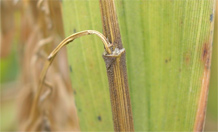
Rice blast fungus has decimated crops in some of the world's poorest countries
£2 million research boost for Exeter scientists is part of major international push to help the world’s poorest farmers
£2 million research boost for Exeter scientists is part of major international push to help the world’s poorest farmers.
University of Exeter scientists have received a £2 million boost to their efforts to tackle crop diseases that affect farmers globally – from Sub Saharan Africa to South West England.
The researchers are aiming to create new rice varieties for African nations that are resistant to rice blast disease - the most devastating disease of cultivated rice, which destroys enough rice each year to feed 60 million people. The Exeter team also hopes its discoveries will help closer to home, with ongoing research into wheat and barley diseases, which are an increasing problem for South West farmers.
The research team has been awarded £1.93 million from the Biotechnical and Biological Sciences Research Council (BBSRC) out of a £16 million cash pot to harness biosciences to improve food security in developing countries. The money includes a £5 million contribution from the Bill & Melinda Gates Foundation (BMGF), through a grant to BBSRC, and £7 million from the Department of Biotechnology (DBT) of India’s Ministry of Science and Technology. The University is investing an additional £250,000 from the Halpin Scholarship programme. The programme has donated almost £1 million to support the study of this disease at Exeter in the last four years, allowing young scientists from rice-growing regions of the world to come and be trained at the University of Exeter.
Rice provides almost one quarter of the calories we consume and is the primary dietary staple for at least 70 per cent of the world’s poorest people. Rice blast disease, caused by a fungus Magnaporthe oryzae, is found throughout the world but is now particularly damaging in developing countries in Africa. Although no-one knows the precise impact of rice blast disease on yields, losses of 50 to 80 per cent are not uncommon.
Rice blast resistance genes will then be bred into cultivars that are adapted to Africa. New high-yielding cultivars of rice are now being grown widely in sub-saharan African countries but many are susceptible to rice blast disease.
The Exeter team will identify sources of resistance to rice blast by screening a wide selection of rice varieties. They will use the most up-to-date science to identify resistance to wild population of the rice blast fungus from Africa and then use cutting-edge plant breeding techniques to produce durably resistant rice varieties.
The University of Exeter team will be working with scientists from Makerere University, Uganda; Kenya Agricultural Institute; Biosciences for Eastern and Central Africa; International Livestock Research Institute, Kenya; Station de Recherches de Farako-Bâ, Burkina Faso; Ohio State University, USA and the University of Arkansas, USA.
Lead researcher Professor Nick Talbot of the University of Exeter's Biosciences department, said: “This is an ambitious project which addresses a key problem in ensuring global food security. I am excited to be working with a group of scientists from around the world to try to tackle such an important disease.
“The project builds on recent significant investments in plant diseases research at Exeter. We are now a leading centre for studying diseases of plants, with more than £10 million in current grants and around 40 scientists, studying a wide range of diseases. These include diseases of cereals such as maize, wheat, rice and barley, as well as more diverse crops such as brassicas and bananas. These are global problems, but we are also addressing the emerging diseases of trees that are so important in the UK. We are, for example, actively studying Ash die-back disease and the range of diseases affecting woodlands in the South-West.”
Deputy Prime Minister Nick Clegg said: “One billion people currently go to bed hungry every night. By 2050 there will be another two billion mouths to feed. And experts predict the world will need to be able to grow 70 per cent more food.
“The UK’s world class bioscience sector is dedicating vital knowledge and expertise to tackling this global problem. This investment will bring together experts at 14 British Universities and Institutes who will work with famers in Africa and Asia to develop crops that are resistant to disease, pests and drought.
“Farmers need these innovations to protect their own livelihoods and the health of their communities.”
In addition to research in this critical area, the University of Exeter offers a Masters degree in Food Security and Sustainable Agriculture: www.exeter.ac.uk/foodsecurity
Date: 20 November 2012
